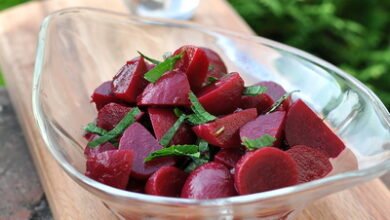
Can Dogs Eat Chicken Salad? The Basics Chicken is usually safe for dogs when it’s cooked plainly. It’s a good source of lean protein and essential nutrients.
However, traditional chicken salad often includes harmful ingredients like onions, mayonnaise, and various seasonings. To keep your dog healthy, it’s crucial to check the ingredients before sharing any chicken salad with your pet. Let’s explore that- Can Dogs Eat Chicken Salad?
Safe Chicken Salad Ingredients for Dogs
Can Dogs Eat Chicken Salad? If you’re considering sharing a chicken salad with your dog, it’s essential to choose ingredients that are safe and beneficial for them. Here’s a guide to the dog-friendly ingredients you can include to make a safe and healthy chicken salad for your furry friend.
1. Plain, Cooked Chicken
- Benefits: Plain, cooked chicken is a lean protein source that supports muscle health and provides essential nutrients for dogs.
- Preparation Tip: Ensure the chicken is fully cooked and free from any seasoning, sauces, or oils that could be harmful.
2. Carrots and Celery
- Benefits: Carrots and celery are dog-safe vegetables that add crunch and nutrition to the salad. Carrots are rich in vitamins and fiber, while celery provides additional vitamins and helps with hydration.
- Preparation Tip: Chop these vegetables into small, manageable pieces to avoid any choking hazards and make them easier for your dog to digest.
3. Plain Yogurt or Pumpkin Puree
- Benefits: Plain yogurt or pumpkin puree can serve as healthier alternatives to mayonnaise. They add a creamy texture without the high fat content. Plain yogurt can also provide probiotics for digestive health, while pumpkin puree is good for digestion and adds a bit of sweetness.
- Preparation Tip: Use plain yogurt without any added sugars or artificial sweeteners. Ensure the pumpkin puree is plain and not mixed with spices or sugar.
By sticking to these safe ingredients—plain, cooked chicken, dog-friendly vegetables like carrots and celery, and healthier alternatives like plain yogurt or pumpkin puree—you can create a nutritious and enjoyable treat for your dog. Always keep in mind that moderation is key, and consulting your vet before introducing new foods is the best practice for maintaining your dog’s health.
Harmful Chicken Salad Ingredients to Avoid
Can Dogs Eat Chicken Salad? When preparing or considering sharing chicken salad with your dog, it’s crucial to be aware of which ingredients can be harmful. Here’s a breakdown of the key ingredients in traditional chicken salad that you should avoid to keep your dog safe.
1. Onions and Garlic
- Risks: Both onions and garlic contain compounds that are toxic to dogs. Even small amounts can lead to severe health issues, such as anemia and gastrointestinal problems.
- Symptoms: Watch for signs like vomiting, diarrhea, lethargy, and difficulty breathing if your dog consumes these ingredients.
2. Mayonnaise
- Risks: Mayonnaise is high in fat, which can contribute to pancreatitis, obesity, and digestive upset in dogs. Its rich, fatty content is not suitable for canine digestion.
- Symptoms: If ingested, your dog might experience vomiting, diarrhea, or signs of abdominal discomfort.
3. Grapes or Raisins
- Risks: Grapes and raisins are extremely toxic to dogs, even in small quantities. They can cause severe kidney damage, which can be life-threatening if not treated promptly.
- Symptoms: Symptoms of grape or raisin toxicity include vomiting, diarrhea, lethargy, and signs of kidney failure such as excessive thirst or urination.
To ensure your dog’s safety, avoid including these harmful ingredients in any chicken salad or similar treats. Always check the ingredients list and opt for dog-safe alternatives to keep your furry friend happy and healthy. If you suspect your dog has consumed any of these toxic ingredients, contact your vet immediately for advice and treatment.
Health Risks of Chicken Salad for Dogs
Can Dogs Eat Chicken Salad? While chicken salad might seem like a tasty treat for your dog, it’s important to understand the potential health risks associated with it. Here’s a closer look at the dangers of feeding chicken salad to dogs and why it’s crucial to be cautious.
1. Pancreatitis
- Cause: High-fat ingredients like mayonnaise can trigger pancreatitis in dogs. This condition occurs when the pancreas becomes inflamed, often due to a fatty diet.
- Symptoms: Symptoms of pancreatitis include abdominal pain, vomiting, diarrhea, and lethargy. In severe cases, it can lead to more serious health issues and require veterinary intervention.
2. Food Poisoning
- Cause: Improperly cooked or stored chicken can harbor harmful bacteria such as Salmonella or Campylobacter, which pose a risk of food poisoning.
- Symptoms: Dogs with food poisoning may exhibit symptoms such as vomiting, diarrhea, abdominal pain, and fever. Ensuring that chicken is thoroughly cooked and handled safely can help prevent these risks.
3. Toxicity
- Cause: Ingredients like onions, garlic, and grapes are toxic to dogs and can lead to serious health issues. Onions and garlic can cause anemia and gastrointestinal distress, while grapes and raisins can lead to kidney failure.
- Symptoms: Toxic reactions might include vomiting, diarrhea, lethargy, and changes in urination or thirst. Immediate veterinary attention is necessary if you suspect your dog has ingested any toxic ingredients.
Feeding your dog chicken salad can pose several health risks, from pancreatitis and food poisoning to serious toxicity from certain ingredients. Always be mindful of what goes into your dog’s food and consult with your veterinarian before introducing new human foods into their diet. Opt for safer alternatives to ensure your dog’s well-being.
Can Dogs Benefit from Chicken Salad?
Can Dogs Eat Chicken Salad? When considering whether chicken salad can be beneficial for your dog, it’s important to evaluate the specific components of the dish. While plain chicken is generally a healthy protein source for dogs, other ingredients in traditional chicken salad might not offer much benefit. Here’s a closer look at the potential benefits and why serving individual ingredients might be a better option.
1. Plain Chicken
- Benefits: Plain, cooked chicken provides high-quality protein that supports muscle health and offers essential nutrients for your dog. It is a good source of lean protein and can be a healthy addition to your dog’s diet.
- Preparation Tip: Ensure the chicken is cooked thoroughly and served without any seasoning or sauces.
2. Dog-Safe Vegetables
- Benefits: Vegetables like carrots or sweet potatoes are safe and nutritious for dogs. Carrots offer vitamins and fiber, while sweet potatoes provide additional nutrients and are gentle on a dog’s digestive system.
- Preparation Tip: Serve these vegetables cooked and cut into small, manageable pieces to avoid choking hazards.
3. Serving Suggestions
- Recommendation: Instead of mixing these beneficial ingredients into a salad, it’s often better to serve them separately. This approach allows you to control portion sizes and ensures that your dog avoids harmful ingredients typically found in chicken salad.
- Alternatives: Consider offering plain chicken along with a side of cooked carrots or sweet potatoes as a balanced and dog-friendly meal.
While plain chicken and certain vegetables can be beneficial for dogs, the overall benefit of chicken salad is limited due to the presence of harmful ingredients. For a healthier approach, serve these beneficial components individually and avoid including any potentially dangerous elements. Always consult with your veterinarian before introducing new foods to your dog’s diet to ensure their health and safety.
How to Make a Dog-Friendly Chicken Salad
Can Dogs Eat Chicken Salad? If you’re considering making a chicken salad that’s safe for your dog, it’s important to focus on the ingredients that are beneficial and avoid those that could be harmful. Here’s a guide to creating a dog-friendly version of chicken salad.
1. Use Unseasoned, Cooked Chicken
- Preparation: Start with plain, cooked chicken. Avoid using any seasonings, spices, or sauces, as these can be harmful to dogs. Cook the chicken thoroughly to kill any potential bacteria.
- Benefits: Chicken provides a high-quality protein source that’s essential for your dog’s muscle health and overall well-being.
2. Add Dog-Friendly Vegetables
- Carrots: These are crunchy and rich in vitamins, making them a great addition. Cook carrots until they’re soft and cut them into small, manageable pieces for your dog.
- Green Beans: Another excellent vegetable for dogs, green beans are low in calories and high in fiber. Serve them cooked and cut into small pieces to avoid choking hazards.
- Benefits: Vegetables provide additional nutrients and fiber, promoting a healthy digestive system.
3. Skip High-Fat Dressings
- Alternatives: Instead of using high-fat dressings like mayonnaise, opt for plain yogurt or pumpkin puree. Both options are lower in fat and can be a healthier choice for your dog.
- Preparation: Use plain, unsweetened yogurt or canned pumpkin (not pumpkin pie filling) as a dressing. These alternatives add a creamy texture without the risk of unhealthy fats.
- Benefits: Plain yogurt provides probiotics that support digestion, while pumpkin puree offers fiber and can aid in digestive health.
Making a dog-friendly chicken salad involves using simple, wholesome ingredients that are safe and beneficial for your pet. By starting with plain, cooked chicken and adding safe vegetables, you can create a tasty treat for your dog. Skip the high-fat dressings and opt for healthier alternatives like plain yogurt or pumpkin puree. Always remember to consult with your veterinarian before introducing new foods into your dog’s diet.



